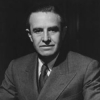W. Averell Harriman

W. Averell Harriman
William Averell Harrimanwas an American Democratic politician, businessman, and diplomat. He was the son of railroad baron E. H. Harriman. He served as Secretary of Commerce under President Harry S. Truman and later as the 48th Governor of New York. He was a candidate for the Democratic presidential nomination in 1952, and again in 1956 when he was endorsed by President Truman but lost to Adlai Stevenson both times...
NationalityAmerican
ProfessionPolitician
Date of Birth15 November 1891
CountryUnited States of America
I felt a certain responsibility to help the British, as I had urged the British to abandon their export trade and convert to war production.
I was very much concerned over our failure to come to an agreement with the British on continuing Lend-Lease assistance after the war was over.
If FDR had lived, the cold war wouldn't have developed the way it did, because Stalin would have tried to get along with Roosevelt.
This was the period when I used all the influence I had to get the British to abandon their export trade, and as much as possible convert all of their manufacturing facilities to the immediate needs of the war, including civilian, as well as military requirements.
We became convinced that, regardless of Stalin's awful brutality and his reign of terror, he was a great war leader. Without Stalin, they never would have held.
The Russians obtained a number of plants under Lend-Lease, which had been authorized by Washington, that I thought were not justified for their war effort. They wanted them for postwar use.
The war changed everybody's attitude. We became international almost overnight.
Actually I'd had a certain amount of experience in Europe in the inter-war period, as a banker, and I was also a member of the Board of Directors of the International Chamber of Commerce.
It was fear. He didn't want to see a united Germany. Stalin made it clear to me - I spoke with him many times - that they couldn't afford to let Germany build up again. They'd been invaded twice, and he wasn't willing to have it happen again.
I think there are telegrams that may or may not be available, which indicated that I very much had in mind the need to give Europe substantial aid after the war, after Lend-Lease was over.
How could you justify giving Holland twice the amount of money that you gave Belgium? Well, finally, I put it up to them. They said that they couldn't do it; it would destroy them. I said they had to do it. And I finally got support from Hoffman on it.
Much of the aid we first gave to Russia we took away from what we promised Britain. So in a sense, Britain participated in a very real way in the recovery of Russia.
We were talking about really getting Europe on its feet. It was our hope that there would be a breakdown of trade barriers in Europe first, and then eventually a breakdown internationally, which would help increase trade with Europe.
The biggest trade that Germany and Britain had was with each other, in the prewar period; I think I'm right in that. Two highly industrialized nations had the most trade with each other, and it wasn't tariff policies alone that made trade relations better for both of them.